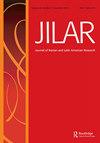文学与生存:来自边境彼岸的教训
IF 0.3
0 HUMANITIES, MULTIDISCIPLINARY
Journal of Iberian and Latin American Research
Pub Date : 2022-01-02
DOI:10.1080/13260219.2022.2087308
引用次数: 0
摘要
本文以拉丁美洲研究为背景,对文学和记忆进行了反思,从全球视角切入拉丁美洲的事件,然后阐述了二十世纪下半叶南锥体的戏剧性经历。文武独裁政权通过系统性地进行大规模屠杀、失踪、持续镇压和流放数万公民,在该地区的国家发生了根本性的变化。在每个政权垮台或投降后,追求正义的道路各不相同。这些措施包括将军政府高层绳之以法,举行全民公决以放弃此类审判,或者在向民主过渡的过程中被迫接受具有象征意义的独裁者的存在。作为对公民被迫忍受的最残酷经历的长期后果的清算的一部分,对罪行的谴责以及随之而来的记忆和遗忘的政治占据了中心舞台。它强调有必要在前进和建设民主和参与性社会的同时,学习如何保存这些记忆并根据这些记忆采取行动。同样值得注意的是,教授们在教授文学和文化时被鼓励要有鉴别力,因为教学大纲中包含的材料可以对漠不关心的人产生影响,特别是在法西斯主义暗中发展的民主社会本文章由计算机程序翻译,如有差异,请以英文原文为准。
On Literature and Survival: Lessons from across the Border
ABSTRACT This commentary, which reflects on literature and memory against the backdrop of Latin American Studies, is framed by moving from a global perspective to events in Latin America and then addressing the Southern Cone’s dramatic experience during the second half of the twentieth century. Civic-military dictatorships made radical changes in this region’s countries through their systematic pursuit of massive killings, disappearances, sustained repression, and the exile of tens of thousands of citizens. The pursuit of justice followed different paths after the collapse or surrender of each of the regimes. These ranged from bringing the top echelons of the military juntas to justice, to a plebiscite to forego such trials, or being forced to accept the presence of an emblematic dictator in the transition to democracy. As part of the reckoning with the long-lasting ramifications of the most brutal experience that the citizenry was compelled to endure, the denunciation of crimes and the concomitant politics of memory and oblivion took center stage. It underscores the need to learn ways of preserving and acting on the memories while moving forward and building democratic and participatory societies. It is also noteworthy that professors are encouraged to be discerning while teaching literature and culture, as the material included in a syllabus can make a difference to the indifferent, particularly in democratic societies where fascism has been making insidious headway
求助全文
通过发布文献求助,成功后即可免费获取论文全文。
去求助
来源期刊

Journal of Iberian and Latin American Research
HUMANITIES, MULTIDISCIPLINARY-
CiteScore
0.60
自引率
0.00%
发文量
22
 求助内容:
求助内容: 应助结果提醒方式:
应助结果提醒方式:


